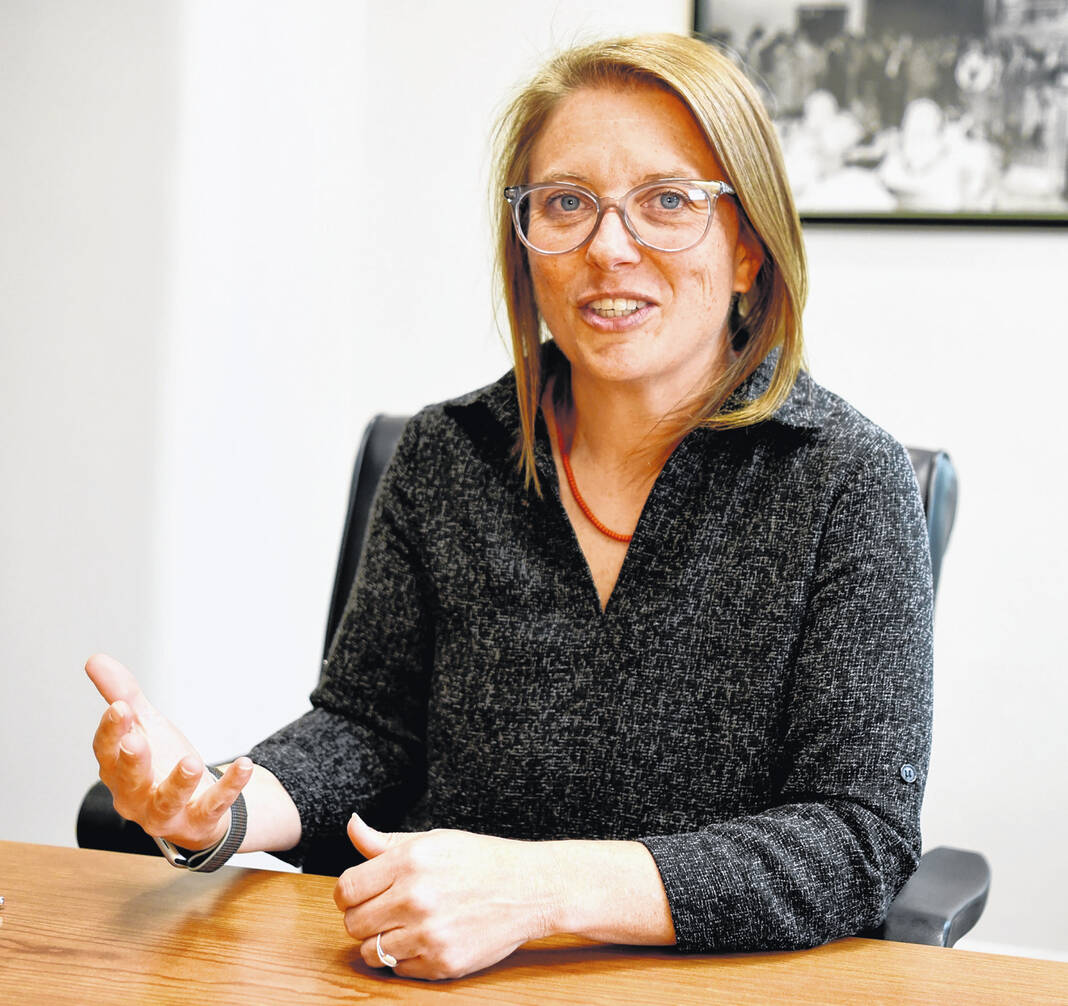
WC Interim President Dr. Corey Cockerill
Photo provided by Randy Sarvis
WILMINGTON — Dr. Corey Cockerill begins each academic year with a new guiding mantra. Last summer, she selected, “Focus Over Hustle.” Little could she imagine then that nine months later she would be Wilmington College’s interim president.
Cockerill started the year with one foot in the faculty and the other in administration as a professor of communication arts and agriculture and assistant vice president for academic affairs. The Board of Trustees named her as WC’s interim president on March 31 when the College transitioned its presidency from Dr. Trevor Bates, who served two-plus years.
She has continued teaching while assuming responsibilities of the chief executive. Cockerill noted that, with all the demands placed upon her, this year’s mantra was “serendipitous,” as she prioritizes and focuses on the goal of attaining the highest quality fruit from her labor and collaborations.
“Focus over hustle keeps me centered. It couldn’t be more fitting,” she said. “As I tell my students in April, now is the time to focus, especially if you’re graduating — or if you’re put in the position that I’ve been placed in.”
Cockerill’s hierarchy of focal points prioritizes students. “They always come first!” she said, noting that WC will continue to provide an engaging and supportive experience for its students that is consistent with its Quaker values.
Other priorities include the interim president’s work with the board and campus community on two pressing issues, the College’s finances and its ongoing preparation for the Higher Learning Commission’s site visit for reaffirmation of accreditation coming during the 2023-24 academic year.
Accreditation is under the normal periodic review. WC is engaged in an exhaustive self-study process that will be submitted to HLC in advance of the coming site visit. Also, Wilmington College, like many colleges and universities, is emerging from the pandemic facing challenging fiscal issues. Successful student recruitment, retention and exploring new sources of revenue are of paramount importance as the institution goes forward.
Cockerill said she is “humbled” by her appointment as interim president, and she is optimistic and ready to collaborate. “This is truly a community effort to work on these priorities,” she said. “I humbly reach out to others: “How can we work together?’
“I am here to help!”
The Board of Trustees will gather later this month for its annual spring meetings. In addition to addressing these topics, they likely will establish a timeline involving the search for WC’s 20th president.
Cockerill joined the faculty almost 15 years ago, but she tapped into an appealing ethos of the campus while working on her master’s degree and Ph.D. at The Ohio State University. Then, she was dating her future husband, Tate Cockerill, a member of WC’s Class of 2003.
“I felt more comfortable on this campus than at OSU. I found a nook in the library where I could work on my research while Tate was in class,” she recalled. She also got to know several of his professors so, in 2008, when a faculty spot opened in communication arts, she had an inside track on securing the position, although her impressive qualifications already made her stand out.
“Wilmington College has been a center of gravity for me,” she added, noting her educational and professional experience in agriculture sparked an interest in her becoming more directly involved with WC’s fastest-growing academic area.
“I told them (ag professors Dr. Monte Anderson and Dr. Don Chafin) they had perfected teaching the science of agriculture but were missing some of its human dimension,” Cockerill said. She noted that the exponential growth in the program over the past 20 years — what has made agriculture WC’s largest academic area — is a result of the boom in female students. Indeed, 73 percent of this year’s ag students are female.
She started the agricultural communications concentration and promoted the value of synthesizing the long-popular Spring Lobby Trip to Washington, D.C., into an iteration more focused on agriculture each fall. Additionally, she helped start a Collegiate Farm Bureau chapter on campus and other opportunities that have diversified agricultural students’ scope of experiences.
Cockerill is a believer in the College’s experiential learning opportunities and often quotes faculty colleague Dr. Chad McKay by saying, “We just don’t read the chapter. We do the chapter.” She embraces the hands-on learning model campus-wide that often leads to a student’s personal transformation.
“We put students in these sometimes uncomfortable and vulnerable experiences and nudge them along,” she said. “We push them forward, then walk beside them. That’s where developing self-confidence and actualization starts. It takes grit, trial and error — the scientific method in practice. It’s an intentional, exploratory and immersive practice and they often come out of it changed and with a shifted perspective — and a self-actualized image of themselves.”
She cited such intimidating experiences as students lobbying a member of Congress or directing a play. “When you come out of something like that, you’ve accomplished things you never thought you were capable of doing,” she added.
“I embrace those learning moments as magical.”

